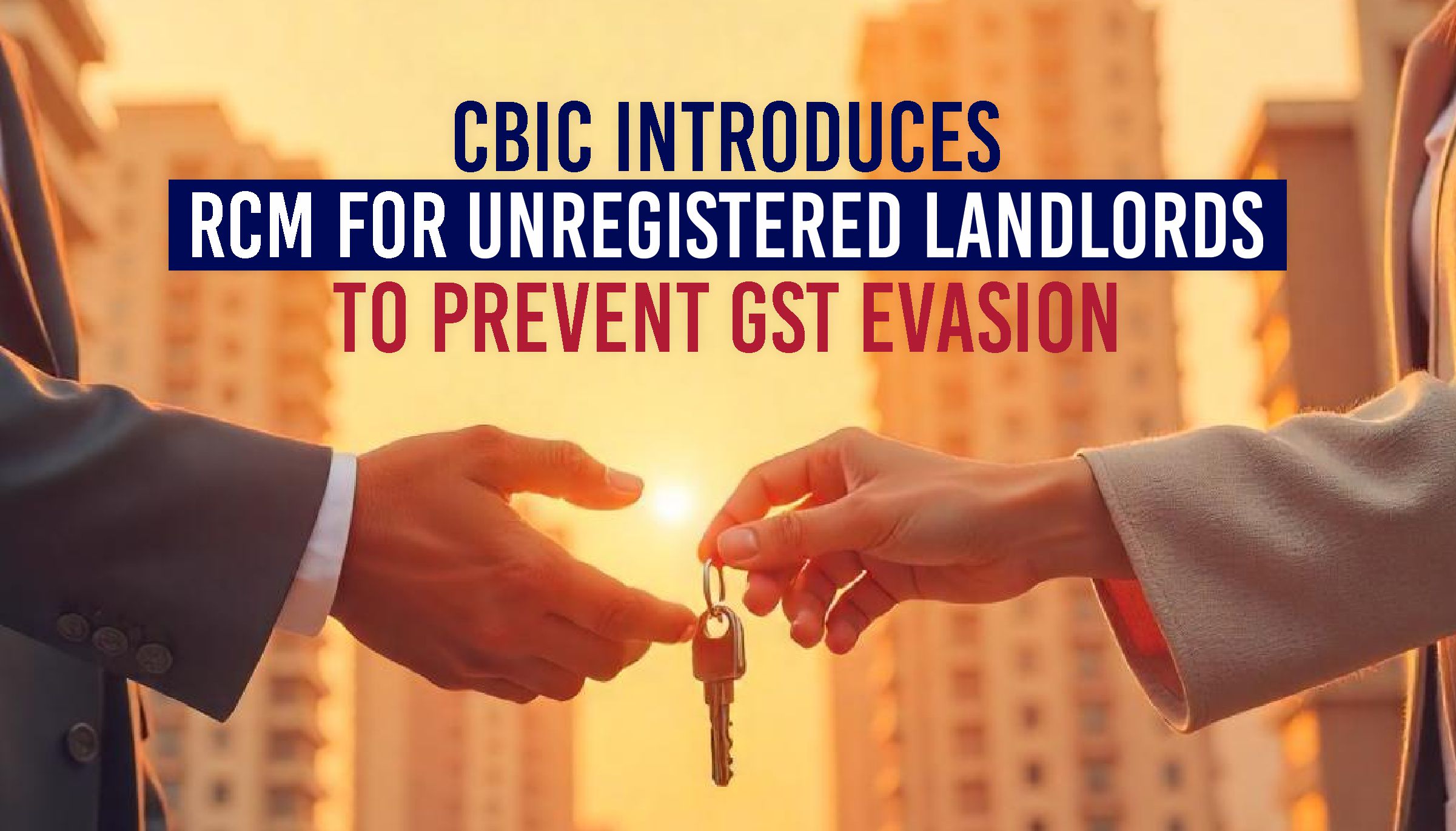CBIC Introduces RCM for Unregistered Landlords to Prevent GST Evasion

In a key development aimed at improving Goods and Services Tax (GST) compliance and curbing revenue leakage, the Central Board of Indirect Taxes and Customs (CBIC) has rolled out Notification No. 09/2024-Central Tax (Rate), dated October 8, 2024. This notification introduces the Reverse Charge Mechanism (RCM) for the renting of commercial properties by unregistered persons to registered entities. The move, effective from October 10, 2024, seeks to address tax evasion in cases where unregistered landlords rent commercial properties to registered entities but fail to remit GST, leading to potential revenue losses for the government.
Understanding the Reverse Charge Mechanism (RCM)
The Reverse Charge Mechanism shifts the responsibility of paying GST from the supplier to the recipient. In the standard GST setup, the supplier of goods or services collects and remits the tax to the government. However, under RCM, this burden is transferred to the buyer or recipient of the service. For example, if an unregistered landlord rents out a commercial property to a registered business entity, the tenant (as the recipient) will now be required to calculate and pay the applicable GST directly to the government, bypassing the supplier who is not registered for GST.
The Existing Issue: Revenue Leakage from Unregistered Persons
Prior to this notification, when unregistered landlords rented out commercial properties to registered businesses, these landlords were not obligated to charge or remit GST, as they were not registered under the GST framework. This created a loophole, allowing tax evasion and revenue leakage. In many cases, the government was unable to collect the rightful GST from such transactions, as the unregistered landlords were outside the tax net.
For registered businesses renting commercial properties, this setup posed a compliance risk. While businesses are required to maintain tax compliance, the absence of tax documentation from unregistered landlords created ambiguities. Additionally, the government was losing out on significant GST revenues in this sector, particularly in the commercial real estate market.
How This Circular Will Change Things
With the introduction of RCM for renting commercial properties, the government aims to address this issue head-on. The notification specifically adds a new entry, “5AB,” to the list of services subject to RCM under Notification No. 13/2017-Central Tax (Rate). The key provisions are as follows:
-
New RCM Entry for Renting Commercial Property:
-
The notification introduces a new entry—5AB—that makes renting of properties (excluding residential dwellings) by unregistered persons to registered persons subject to RCM. This means that when a registered business rents a commercial property from an unregistered landlord, the business will now be responsible for calculating and paying the GST directly to the government.
-
-
Impacted Sectors:
-
The sectors most affected by this change are commercial real estate and rental services where businesses rent office spaces, warehouses, and other commercial properties. Any GST-registered entity that rents a commercial property from an unregistered person will now be required to ensure compliance under the RCM rules.
-
-
Consistent Across GST Acts:
-
The new rule applies not only under the Central Goods and Services Tax Act, 2017 (CGST Act), but also under the Integrated Goods and Services Tax Act, 2017 (IGST Act) and the Union Territory Goods and Services Tax Act, 2017 (UTGST Act). This ensures uniform application of the rule across all states and union territories.
-
-
Effective Date:
-
The RCM provisions for commercial property rentals by unregistered persons will come into effect on October 10, 2024, providing businesses and landlords a brief window to prepare for compliance.
-
Closing the Loophole: Enhancing GST Collections
The introduction of RCM for renting commercial properties addresses a long-standing gap in GST collections. By placing the responsibility of paying GST on registered recipients, the government can now ensure that taxes are correctly paid, even when the supplier (landlord) is unregistered. This move is expected to boost GST revenues from the real estate sector, ensuring that transactions involving commercial property rentals are fully taxed.
The CBIC’s decision to introduce RCM for renting commercial properties by unregistered persons to registered entities is a crucial step in preventing GST evasion and closing loopholes that have contributed to revenue leakage. Businesses must now adapt to these changes by ensuring they comply with the RCM provisions, as failure to do so could result in penalties. This notification not only strengthens GST compliance but also enhances the government’s ability to collect taxes effectively, especially in the commercial real estate sector.
